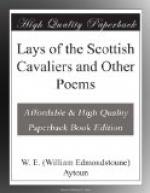The perfect serenity of the man in the hour of trial and death, the courage and magnanimity which he displayed to the last, have been dwelt upon with admiration by writers of every class. He heard his sentence delivered without any apparent emotion, and afterwards told the magistrates who waited upon him in prison, “that he was much indebted to the Parliament for the great honour they had decreed him”; adding, “that he was prouder to have his head placed upon the top of the prison, than if they had decreed a golden statue to be erected to him in the market-place, or that his picture should be hung in the King’s bedchamber.” He said, “he thanked them for their care to preserve the remembrance of his loyalty, by transmitting such monuments to the different parts of the kingdom; and only wished that he had flesh enough to have sent a piece to every city in Christendom, as a token of his unshaken love and fidelity to his king and country.” On the night before his execution, he inscribed the following lines with a diamond on the window of his jail:—
“Let them bestow on every airth
a limb,
Then, open all my veins, that I may swim
To thee, my Maker! in that crimson lake;
Then place my parboiled head upon a stake—
Scatter my ashes—strew them
in the air:
Lord! since thou know’st where all
these atoms are,
I’m hopeful thou’lt recover
once my dust,
And confident thou’lt raise me with
the just.”
After the Restoration, the dust was recovered, the scattered remnants collected, and the bones of the hero conveyed to their final resting-place by a numerous assemblage of gentlemen of his family and name.
There is no ingredient of fiction in the historical incidents recorded in the following ballad. The indignities that were heaped upon Montrose during his procession through Edinburgh, his appearance before the Estates, and his last passage to the scaffold, as well as his undaunted bearing, have all been spoken to by eyewitnesses of the scene. A graphic and vivid sketch of the whole will be found in Mr. Mark Napier’s volume, The Life and Times of Montrose—a work as chivalrous in its tone as the Chronicles of Froissart, and abounding in original and most interesting materials; but, in order to satisfy all scruple, the authorities for each fact are given in the shape of notes. The ballad may be considered as a narrative of the transactions, related by an aged Highlander, who had followed Montrose throughout his campaigns, to his grandson, shortly before the battle of Killiecrankie.
THE EXECUTION OF MONTROSE
I.
Come hither, Evan Cameron!
Come, stand beside my knee—
I hear the river roaring down
Towards the wintry sea.
There’s shouting on the mountain
side,
There’s war within the
blast—
Old faces look upon me,
Old forms go trooping past.
I hear the pibroch wailing
Amidst the din of fight,
And my dim spirit wakes again
Upon the verge of night!




